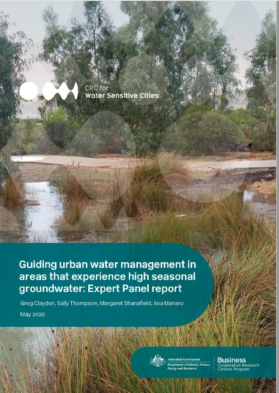Guiding urban water management in areas that experience high seasonal groundwater: Expert Panel report.
Executive Summary
The Cooperative Research Centre for Water Sensitive Cities (CRCWSC), in collaboration with research and industry partners, has been progressing Integrated Research Project 5 (IRP5) – Knowledge-based water sensitive solutions for development in high groundwater environments) (CRCWSC 2017). As part of Stage 2 of IRP5—Guiding urban water management in areas of the Swan Coastal Plain that experience high seasonal groundwater—the CRCWSC established an Expert Panel in September 2019 to prepare two main products:
- Technical guidance for planning and designing urban developments in high groundwater areas, building on practitioners’ and researchers’ experience and knowledge of the Swan Coastal Plain in Western Australia
- Recommendations for further research, data and information collection and/or methods that may improve the guidance over time.
The Expert Panel comprised Associate Professor Dr Sally Thompson from The University of Western Australia (UWA), Dr Margaret Shanafield from the National Centre for Groundwater Research and Training (Flinders University, Adelaide), and Greg Claydon (Chair, and CRCWSC Board Director), assisted by Research Associate Dr Ana Manero (UWA, Perth).
The Panel has produced this report based on site visits, detailed discussions, and feedback on an earlier draft report from a range of Western Australia based urban development industry practitioners and consultants, local and state government officials and researchers, and in consultation with the Urban Development Industry Association's (UDIA) Water Committee for WA, the multi-stakeholder Land Development in Groundwater Constrained Environments Steering Group (convened by the Institute of Public Works Engineering Australasia (IPWEA) WA branch) and the Western Australian Local Governments Association (WALGA)), the CRCWSC’s Western Region Advisory Panel, and Perth’s Water Sensitive Transition Network. This report also draws on relevant previous work by the CRCWSC and the Expert Panel’s own tacit knowledge and experiences.
